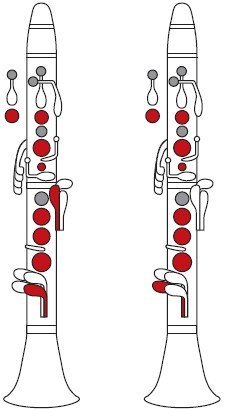Introduction to the G# Lydian Scale
The G# Lydian scale in clarinet music opens a captivating chapter of musical history. As one of the seven musical modes, the Lydian mode stands out with its raised fourth degree, creating a bright and airy sound that has resonated with musicians for centuries. But why does the G# Lydian scale hold such significance for clarinet players? Let's explore the fascinating journey of this scale through time, culture, and musical innovation!

Clarinet Fingering Charts are always FREE at MartinFreres.net!
Understanding the G# Lydian Scale
The G# Lydian scale is composed of the notes G#, A#, B#, C## (enharmonically D), D#, and E#. This unique combination creates an ethereal and uplifting sound that many musicians find irresistible. Clarinetists who incorporate this scale into their repertoire can add a distinctive flair to their performances, making their music stand out.
| Note | Position in Scale | Characteristic |
|---|---|---|
| G# | Root | Tonal center |
| A# | 2nd | Whole step from root |
| B# | 3rd | Major third |
| C## (D) | 4th | Raised fourth (Lydian characteristic) |
| D# | 5th | Perfect fifth |
| E# | 6th | Major sixth |
Historical Roots and Cultural Significance
The G# Lydian scale has roots that extend beyond Western classical music. Its essence can be found in various musical traditions around the world, crossing cultural boundaries and encouraging musical fusion. As contemporary music styles have evolved, this scale has experienced a resurgence, with artists using its unique tonalities to evoke a range of emotions and atmospheres. This is particularly noticeable in jazz and modern classical compositions, where improvisation plays a central role.
Claude Debussy's Influence
Claude Debussy, a pioneering composer, often used scales similar to G# Lydian in his work. His innovative approach to harmony and melody opened new avenues for musical expression. Debussy's compositions continue to inspire clarinetists to explore the rich textures and expressive possibilities of Lydian-like scales. The smooth transitions and intricate runs in his pieces showcase the clarinet's versatility, making it an ideal instrument for this musical style.
Improvisation and the G# Lydian Scale
For performers, the G# Lydian scale offers a wealth of improvisational possibilities. The scale's unique structure allows clarinetists to create vivid, expressive phrases that captivate listeners. Picture your fingers dancing across the keys, emphasizing that distinctive raised fourth that gives the Lydian mode its character. This approach can truly engage an audience, building musical tension and resolution through thoughtful melodic choices.
Technical Aspects for Clarinetists
Mastering the G# Lydian scale requires attention to the technical aspects of clarinet playing. The instrument's layout and fingerings can present challenges when playing this scale, but with dedicated practice, these hurdles can lead to impressive musical achievements. Focusing on scales, arpeggios, and etudes that feature the G# Lydian framework can significantly improve a player's endurance and finger dexterity. As musicians become more comfortable with the scale, incorporating it into their repertoire becomes increasingly natural.
Contemporary Influence and Film Music
The allure of the G# Lydian scale continues to capture the imagination of modern musicians. Its enchanting qualities are evident in various contemporary compositions, including film scores that use its distinctive sound to create atmospheric scenes. Next time you hear a hauntingly beautiful clarinet solo in a movie, listen closely – you might just catch the unique flavor of the Lydian scale!
Collaborative Musical Experiences
The G# Lydian scale serves as a bridge for musical collaboration across different styles and backgrounds. In jam sessions, clarinetists experimenting with this scale can create exciting and innovative musical dialogues. The interplay between a clarinet exploring Lydian territory and, say, a guitarist adding complementary chord progressions can result in truly magical musical moments.
Conclusion: The Enduring Legacy of G# Lydian
The historical impact of the G# Lydian scale on clarinet music is both profound and ongoing. Its influence spans generations of composers, performers, and improvisers. As we continue to explore the expressive potential of the clarinet, the unique sounds of the G# Lydian scale remain a valuable resource. More than just a series of notes, this scale represents a journey through musical history, a palette for emotional expression, and a connecting thread between diverse musical traditions.
Table of Contents
- Introduction to the G# Lydian Scale
- Understanding the G# Lydian Scale
- Historical Roots and Cultural Significance
- Claude Debussy's Influence
- Improvisation and the G# Lydian Scale
- Technical Aspects for Clarinetists
- Contemporary Influence and Film Music
- Collaborative Musical Experiences
- Conclusion: The Enduring Legacy of G# Lydian








